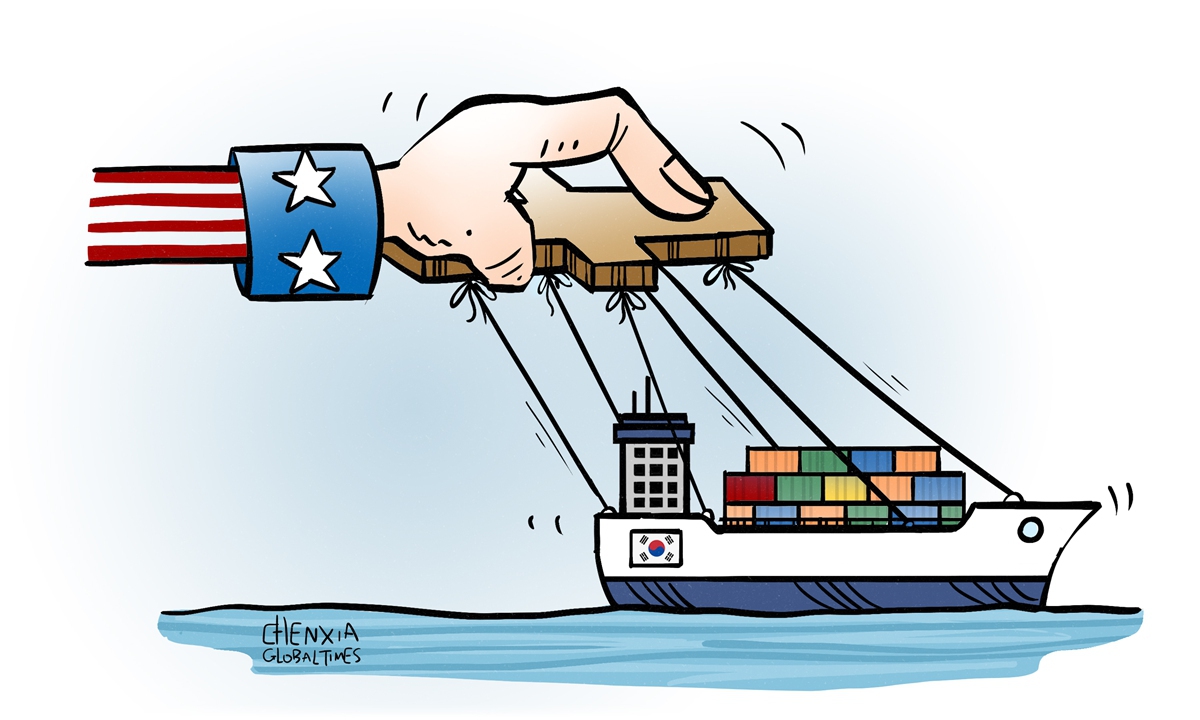S. Korea should resist US geopolitical pressure, and foster smooth trade relations with China

Illustration: Chen Xia/Global Times
South Korean foreign trade suffered several setbacks last year, but it is seeing positive opportunities in 2024. China's information technology (IT) industry is recovering at a rate of 9.3 percent this year, surpassing the global average of 6.8 percent. This development is expected to drive an increase in South Korea's IT products exports to China, according to a report released by the Korea International Trade Association (KITA).South Korea's exports to China have been sluggish, mainly dragged down by weakened exports of semiconductor and other IT products. The recovery of demand in related industries in China is undoubtedly good news for South Korean exports and economic recovery. However, it is important for South Korea to remove external political interference, say from the US, in its trade with China if it wants to capitalize on the opportunities brought by the recovering demand in the Chinese market.
In 2023, South Korea's economic growth was hindered by weak export numbers. The decline in exports to China has raised widespread concerns in South Korea. According to statistics from the KITA, China's imports from South Korea in 2023 amounted to $162.5 billion, a sharp decrease of 18.8 percent compared with the previous year. This has also led to a trade deficit of $18 billion with China, the first time in 31 years.
The sharp and sudden changes in South Korea's exports to China in the short term are the result of multiple factors, such as changes in the trade structure between the two countries, as well as geopolitical interference from countries like the US.
From the perspective of trade structure, the competition and cooperation between China and South Korea in recent years have indeed increased. However, there is no doubt that mutual beneficial cooperation in economic and trade remains the mainstay. Despite the efforts of the US and the West to reduce South Korea's trade integration with China for their geopolitical interests, China remains South Korea's largest trading partner.
In 2024, its exports to China remain an important component contributing to South Korea's overall economy. The close economic cooperation between China and South Korea is determined by the objective laws of international economic and trade cooperation. The sustained and steady growth of the Chinese economy has led to the formation of a relatively stable supply chain and industrial chain cooperation between China and South Korea. For South Korea, the correct direction is to improve and enhance this mutually beneficial cooperation.
If South Korea, as advocated by the Western media, succumbs to political pressure from the US and artificially distances itself from China's industrial chain and economic cooperation, it will undoubtedly severely harm South Korea's economy and corporate interests. It is not easy for South Korea to find an alternative market to replace China. It is simply not feasible for South Korea to "decouple" itself from the mutually beneficial industrial and economic cooperation with China.
If anything, the weak exports in 2023 serve as a significant warning for South Korea, highlighting the detrimental impact of geopolitical pressures on its economy. The US-led "reducing reliance on China" has increased economic risks for South Korea. Under the US-driven policies of "re-shoring" industries and technological suppression against China, South Korea's two key industries, namely semiconductor and autos, have been severely affected.
Recently, there has been intensive coverage by Western and Japanese media claiming that the US, Japan, and South Korea are reducing dependence on trade with China. An article by Nikkei on February 8 claimed that "US, Japan and South Korea scale back trade reliance on China." As a highly export-oriented economy, South Korea is heavily reliant on overseas markets, and a significant reduction in exports to China would undoubtedly have a negative impact on its economy. It is clear that the US politicians and media will not compensate for the losses suffered by South Korean companies.
South Korean should reject such serious political interference that harms the interests of Korean companies and economic growth. If Seoul can eliminate political interference from the US and seize the opportunities brought by China's economic recovery, its exports and economy will benefit. South Korea should ensure that the positive news in the Chinese market will be capitalized on in a timely manner, rather than being constrained by geopolitical pressure and regretting missed the opportunities.
Faced with increasingly complex geopolitical and geo-economic situation and changes in the China-South Korea trade structure, South Korea also needs to explore new models to deepen China-South Korea economic cooperation, open up new areas of cooperation in emerging industries, and continuously explore new areas of growth. Only in this way can South Korea better counter economic shocks from the international market, and achieve long-term and stable economic growth.
The author is a reporter with the Global Times. bizopinion@globaltimes.com.cn



